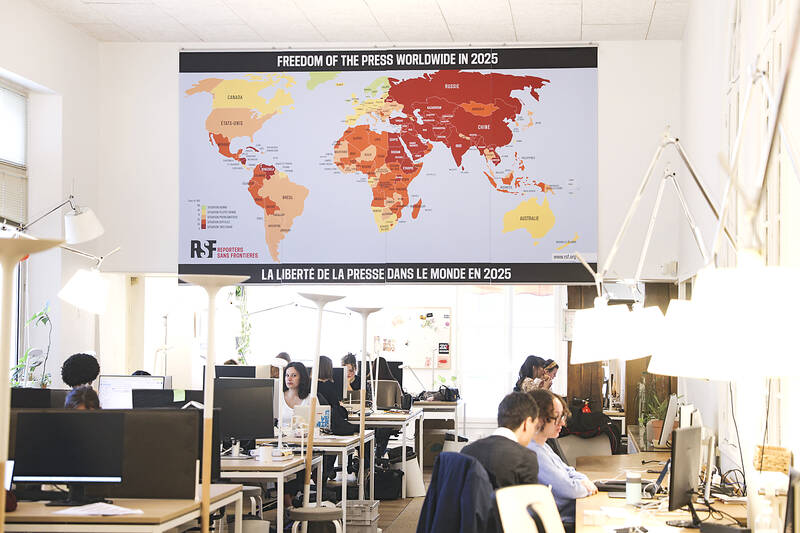Taiwan ranked 24th in this year’s World Press Freedom Index released by Reporters Without Borders (RSF) yesterday, climbing three places from last year, while press freedom declined in most other countries.
Taiwan was second in the Asia-Pacific region and first in East Asia.
Aleksandra Bielakowska, advocacy manager at RSF’s Asia-Pacific Bureau, said that Taiwan’s improvement was largely due to declines elsewhere, as the country’s global score, which was 77.04 this year, was nearly unchanged from a year earlier.

Photo: EPA-EFE
It was “quite significant” how public trust in the media had grown in Taiwan over the past five years, she said, citing the Reuters Institute’s Digital News Report, which showed the metric at 33 percent last year, up from 24 percent in 2020.
However, “government pressure” led English-language public broadcaster TaiwanPlus to remove a report referring to then-US presidential candidate Donald Trump as a “convicted felon” in November last year, Bielakowska said, adding that it was a “rare,” but “deplorable and very worrying” incident.
Public media have a mandate to serve the public and must be able to operate independently from the government, she said.
Public Television Service (PTS), to which TaiwanPlus is affiliated, at the time cited concerns over the TaiwanPlus report’s “objectivity” as the main reason for its removal.
Minister of Culture Li Yuan (李遠) later said that the controversy caused by the report was “very serious” and that his ministry had “informed” PTS of that.
Bielakowska also expressed concern over press freedom in Hong Kong, which dropped to 140th from 135th in the rankings, recording its lowest-ever global score of 39.86 this year.
“Basically, we see that it’s starting to be almost impossible [for Hong Kong journalists] to continue working” in an environment where they face ongoing government pressure and, in some cases, sedition charges for their reporting, she said.
The latest rankings showed that press freedom worldwide deteriorated over the past year to the “difficult” category — the second-lowest in the index’s five-tier system — for the first time since it was launched in 2002.
“More than six out of 10 countries, or 112 in total, saw their overall scores decline in the index,” the group said, attributing the deterioration to economic pressure media firms faced.
The situation largely stemmed from ownership concentration, pressure from advertisers and financial backers, and limited or nontransparent public funding, RSF said.
Norway topped the rankings again this year, followed by Estonia and the Netherlands, according to the index, which is based on surveys of journalists, researchers and human rights advocates worldwide.
At the other end of the list were China (178th), North Korea (179th) and Eritrea (180th and last).

Right-wing political scientist Laura Fernandez on Sunday won Costa Rica’s presidential election by a landslide, after promising to crack down on rising violence linked to the cocaine trade. Fernandez’s nearest rival, economist Alvaro Ramos, conceded defeat as results showed the ruling party far exceeding the threshold of 40 percent needed to avoid a runoff. With 94 percent of polling stations counted, the political heir of outgoing Costa Rican President Rodrigo Chaves had captured 48.3 percent of the vote compared with Ramos’ 33.4 percent, the Supreme Electoral Tribunal said. As soon as the first results were announced, members of Fernandez’s Sovereign People’s Party

MORE RESPONSIBILITY: Draftees would be expected to fight alongside professional soldiers, likely requiring the transformation of some training brigades into combat units The armed forces are to start incorporating new conscripts into combined arms brigades this year to enhance combat readiness, the Executive Yuan’s latest policy report said. The new policy would affect Taiwanese men entering the military for their compulsory service, which was extended to one year under reforms by then-president Tsai Ing-wen (蔡英文) in 2022. The conscripts would be trained to operate machine guns, uncrewed aerial vehicles, anti-tank guided missile launchers and Stinger air defense systems, the report said, adding that the basic training would be lengthened to eight weeks. After basic training, conscripts would be sorted into infantry battalions that would take

GROWING AMBITIONS: The scale and tempo of the operations show that the Strait has become the core theater for China to expand its security interests, the report said Chinese military aircraft incursions around Taiwan have surged nearly 15-fold over the past five years, according to a report released yesterday by the Democratic Progressive Party’s (DPP) Department of China Affairs. Sorties in the Taiwan Strait were previously irregular, totaling 380 in 2020, but have since evolved into routine operations, the report showed. “This demonstrates that the Taiwan Strait has become both the starting point and testing ground for Beijing’s expansionist ambitions,” it said. Driven by military expansionism, China is systematically pursuing actions aimed at altering the regional “status quo,” the department said, adding that Taiwan represents the most critical link in China’s

EMERGING FIELDS: The Chinese president said that the two countries would explore cooperation in green technology, the digital economy and artificial intelligence Chinese President Xi Jinping (習近平) yesterday called for an “equal and orderly multipolar world” in the face of “unilateral bullying,” in an apparent jab at the US. Xi was speaking during talks in Beijing with Uruguayan President Yamandu Orsi, the first South American leader to visit China since US special forces captured then-Venezuelan president Nicolas Maduro last month — an operation that Beijing condemned as a violation of sovereignty. Orsi follows a slew of leaders to have visited China seeking to boost ties with the world’s second-largest economy to hedge against US President Donald Trump’s increasingly unpredictable administration. “The international situation is fraught